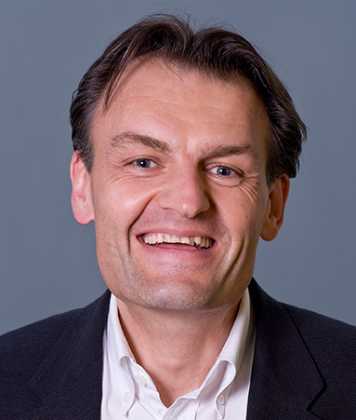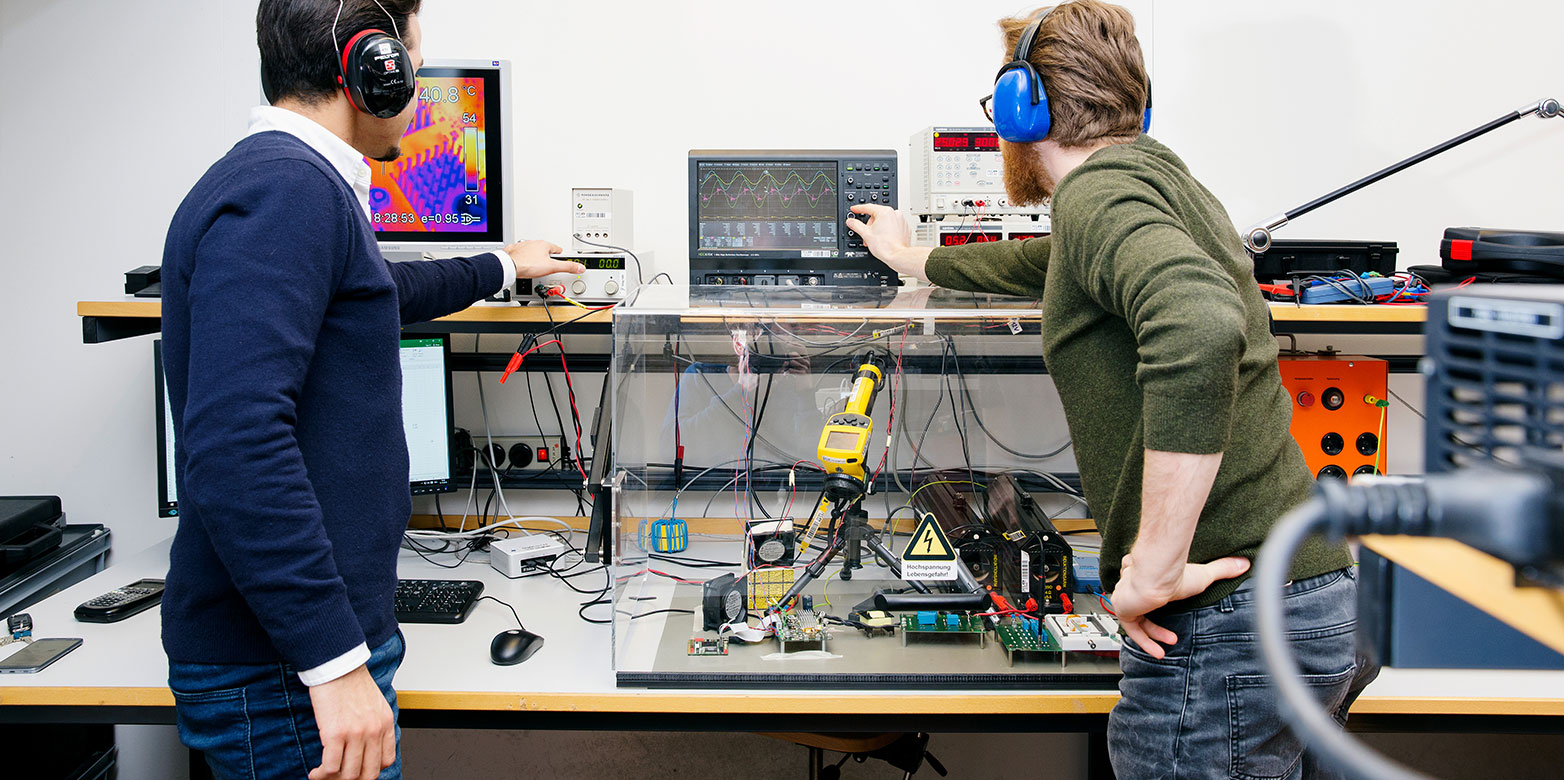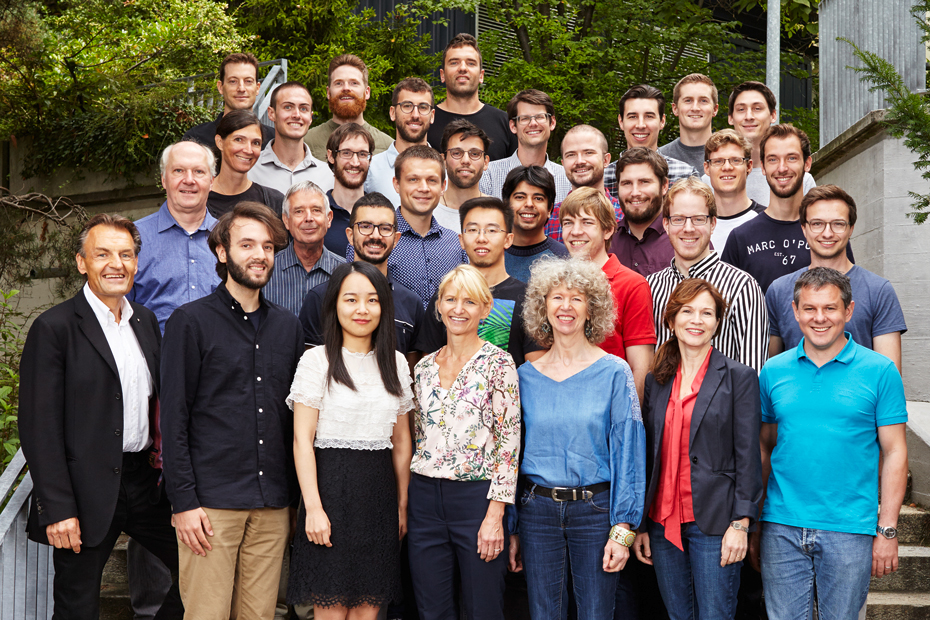"We are focused on making the 'All Electric Society' a reality"
In our interview, Prof. Johann Kolar, Power Electronic Systems Laboratory (PES), talks about the future-oriented research projects of his group, the breathtaking speed at which new concepts are developed today and his regret that the day has only 24 hours.
Prof. Kolar, what is your main area of research?

My research focus is power electronics, more specifically power electronic systems, the link between information technology and power engineering. There are countless examples of systems in which power electronics is used: e.g. in the field of data processing, i.e. in datacenters or in the power grid in connection with the use of renewable energy, in hybrid and electric vehicles, but also in the automation of industrial production processes or robotics. In all these areas, electronically controlled power or energy flows are required.
What brought you to this field? Why does it fascinate you?
I attended a technical high school and was fortunate to have a teacher in electrical engineering with industrial experience in power and microelectronics. I had forgotten about this until I started at university, so back then I was initially more interested in medicine, but – after a first dissecting course – I returned to electrical engineering. In parallel I studied economics for a few semesters. When I was writing my diploma thesis I came across power electronics again and remembered my high school days. From then on, I was completely addicted to power electronics with its broad theoretical and experimental challenges. I would like to convey this passion in my teaching and pass it on to students – in addition to a solid foundation of knowledge – with the aim that they can contribute to the creation of Clean Tech systems.
“I want to convey to students my passion for the creation of new concepts and establish a foundation of expertise so that they can ultimately contribute to making an 'All Electric Society' a reality.”Prof. Johann Kolar
What is the impact of your research on society?
First of all, the dynamic development in my field of research, especially with regard to the translation of new concepts into industry, is breathtaking. Here at the lab, we bring together power semiconductors, filter circuits, sensors, digital signal processing components and electromechanical actuators to create complete systems that are needed in all areas of society, from energy technology to mobility and biomedicine. Examples would include projects such as feeding solar energy into the power grid, wireless energy supply for artificial hearts or a new type of door actuator for the Shinkansen high-speed train in Japan.
In our cooperation with industry, we focus on the "beyond tomorrow" projects, i.e. we do not deal with the next generation of products but with general fundamental questions and distant future industry-related concepts. At present, the field of electric vehicles is extremely dynamic, especially in the area of charging technology, in order to achieve extremely short charging times together with longest possible driving distances. Another aspect is energy distribution in the vehicle and how motors will be designed in the future. The implementation horizon for all this research is around the year 2025, in which – according to forecasts – the costs of electric vehicles will have equaled those of vehicles with combustion engines. Accordingly, an exponential increase in sales of electric vehicles can be expected then. The automotive industry is preparing for this, the cost pressure is enormous.
Another example is future aircraft. Fundamentally new aircraft concepts are conceptualized, in which gas turbines generate electrical energy to power electric fans which are providing the thrust. This allows to completely change the aircraft shape and results in numerous advantages such as lower fuel consumption, 75% less CO2 emissions and 65% lower noise level, and allows to significantly reduce the length of the runways.
We are also involved in developments relating to renewable energies, for example in connection with photovoltaics or wind power. These primarily involve advanced concepts that also aim to store energy over longer periods of time. These concepts are currently tested for their economic viability and will then become generally accepted if the cost profile is right.
Which courses are you teaching this semester?
I have held the lectures "Networks and Circuits I & II" for over 10 years. Only recently I have handed over this task to my colleagues Christian Franck (Part I) and Jürgen Biela (Part II). However, I continue to give a lecture in the Bachelor’s programme on the fundamentals of power electronics and lectures in the Master's programme, namely Power Electronic Systems I and II in the fall and spring semester, respectively.
How do you like ETH as a research institution?
ETH Zurich is an excellent research environment. I like most the ease and the general enthusiasm with which new concepts are created. In general, I am also pleased about the low administrative effort compared to other institutions. I also like the fact that ETH Zurich is extremely forward-looking, i.e. it is always clearly future-oriented and is never satisfied with what it has achieved.
Are you collaborating with other people at D-ITET or other departments at ETH Zurich?
In our lab, we already cover the entire range from the creation and theoretical analysis of new concepts to the realization of industry-oriented hardware, which often forms the basis for the next product generation. Therefore, I often have only occasional collaborations with colleagues at the department, e.g. with Christian Franck on the insulation stress of solid-state transformers for the “Internet of Energy”, or Ulrike Grossner on the design of new power semiconductor modules for “More Electric Aircraft”. Furthermore, we are involved in the Zurich Heart project with the wireless power supply of an implanted artificial heart. The breadth of our activities is also due to the large number of industrial collaborations. In addition, our spin-offs, with which we are naturally closely associated, are also important sources of inspiration.
You founded several spin-offs and according to your website you even employ an "Industry Relations Manager". Can you tell us more about this?
Over the years, contract negotiations with industrial partners have become very complex, especially due to questions about intellectual property and publications. At the lab we have one main research partner per application area in order to avoid IP interferences. But, we are completely transparent internally to allow the open exchange of ideas between doctoral students, anything else would not be sensible. ETH Transfer provides us with solid support in terms of contractual details and patent applications as well.
How international is your group? Are you looking for new doctoral students?
We have 20 doctoral students and 9 nationalities, from Poland and Italy to Brazil and China. Besides working with students, I really appreciate the continuous exchange with doctoral students. With Dr. Dominik Bortis and Dr. Florian Krismer I am busy almost around the clock keeping the lab running and giving the right impulses and guidance. Our hierarchy is very flat, it is really a team effort.
What are currently the biggest challenges in your field of research?
I am experiencing a massive acceleration of workflows due to digitalization, in the scientific field as well as in industry. In addition, climate change, for example, is also an "accelerator" that calls for urgent action, especially in energy technology.
With a small wink: On a personal level, it is often a challenge for me that the day only has 24 hours. I can hardly find enough time to do everything that would be of interest to me.
Professors at D-ITET
In our interview series, professors at D-ITET give an insight into their research and personal motivation to go into academia.

